Stigmas around Down syndrome were challenged thanks to a new ad breaking down stereotypes and urging viewers to reconsider assumptions. As the ad highlighted people born with the condition’s capabilities, positive reactions poured out on social media.
In honor of World Down Syndrome Day, which takes place March 21, the new ad, which challenged people to change the way they think about people with Down syndrome, was produced by CoorDown and Small New York in association with the National Down Syndrome Society (NDSS) and other organizations.
The ad starts with 22-year-old model and actress Madison Tevlin, who has Down syndrome, addressing a bartender.
Madison was filmed saying: “Hey bartender, you assume that I can’t drink a margarita, so you don’t serve me a margarita, so I don’t drink a margarita.
“Your assumption becomes reality.”
Shortly after, Madison began confronting other misconceptions about Down syndrome, such as the notion that people with the condition are incapable of living independently.
She said: “Parents, you assume that I cannot live on my own, so you don’t encourage me to live on my own.”
According to the Global Down Syndrome Foundation, an increasing number of adults with Down syndrome in the U.S. are living independently with limited assistance from family members or the state, and a small percentage can live entirely independently.
CoorDown, an Italian organization, has been leading the Assume That I Can campaign behind the now-viral ad.
Marta Sodano, an Italian woman with Down syndrome, partially inspired the campaign after she spoke at the World Down Syndrome Day Conference at the United Nations, according to an NDSS press release.
In the press release, Marta wrote: “I discovered that in psychology there is a concept called ‘self-fulfilling prophecy,’ whereby a teacher who thinks that a student cannot understand would just act accordingly and therefore would not teach the student.
“And there you go: the prophecy self-fulfills.”
In the ad, 22-year-old model and actress Madison Tevlin, who has Down syndrome, addressed a bartender
“In my opinion, there are no difficult or easy concepts, there is always a simple way to explain things.
“If I think of all the things that were not explained and taught to me, well I get really angry.”
Kandi Pickard, the president and CEO of NDSS, told Today that people were already talking about how the ad has changed their perspective.
She said: “The whole point of this video is to end those stereotypes of people living with Down syndrome.
“Many times people with disabilities are presumed to be unable to care for themselves or unable to make their own decisions and that’s not the case.”
According to the CEO, the ad has opened up conversations in a healthy way for the public to see not only the beauty but the ability of people with Down syndrome.
She said: “This is what we do as an organization day in and day out.
“We want to shift the public perception of Down syndrome.”
People may assume that people with Down syndrome suffer from various limitations, such as getting married, but Tommy and Maryanne Pilling, who both have the condition, debunked the stereotype.
They were married for 25 years, defying initial criticism, before Tommy passed away in 2020.
“My mum has been 100% supportive,” Maryanne Pilling’s sister, Lindi Newman, told Today in 2017. “Anyone should have the right to marry the love of their life without prejudice or discrimination.”
Since the Assume That I Can video launched, many people on social media have shown appreciation for how it encouraged them to confront their biases about Down syndrome.
The CEO behind the ad said people were already talking about how the ad changed their perspectives
View this post on Instagram
A person commented on Instagram: “Being an older sister of a DS person. I am guilty of treating my sister this way sometimes.
“But don’t worry, she sets me straight.”
Another Instagram user wrote: “I just posted something today regarding doubting my son’s capabilities sometimes and this is such a great way to redirect our way of thinking, even as parents.
“Thank you for such a wonderful video.”
CEO Kandi reportedly said that most of the feedback was positive and added that swearing, drinking, and sex were “normal things” in life for most people.
She added: “They’re going to be going to college and there’s an opportunity to go to the bar and have a drink.
“They want to live on their own. They want to do these things.”
As a mom of three, including a 12-year-old with Down syndrome, Kandi said: “For some families, it’s hard to look past that disability and really to be able to see sometimes the opportunities that are out there.”
“This message goes for those with other conditions too,” a reader commented
Explore more of these tags
I’m the father of a daughter who has Downs Syndrome. My daughter will never be able to live on her own, or read Shakespeare. The awesome young lady in the ad is very, very high functioning for someone with Downs Syndrome. She is a very small minority. While the ad is wonderful, it’s also misleading
I agree with you and at the same time, I get absolutely poison-spittingly furious everytime somebody speaks veeery slowly and veeery loudly to my neighbour who happens to have Downs Syndrome. He is perfectly capable of understanding people and does not need everyone to treat him as if he's deaf. It's not wrong to adapt to other people's needs but maybe people could find out first what those needs are instead of making assumptions? That's at least what I take from the clip. And yes, assuming that everyone with DS is high functioning is not helpful either. 🤷🏻♀️
Load More Replies...Like autism, Down Syndrome exists on a spectrum. While we shouldn't assume they are incapable, I've noticed a disturbing trend from these awareness campaigns: namely that once it's accepted that they can be capable, the public starts having less empathy and patience for those who aren't - citing some ad or other awareness campaign and saying, "I don't know why we have to put up with that. Such-and-such organization says they can if they want to, so [individual in front of them] is just acting out/doesn't need special services." Thus punishing the less capable because now they can't live up to what the awareness campaign says about people like them. Campaigns like this one seem to drive people to the opposite extreme. I'd really rather see a more nuanced campaign that shows SOME people can, and some CAN'T, and you OBSERVE before assuming either.
I think it is brilliant - not all people with Down's have severe cognitive impairment, many are capable of living full, independent lives, with little to no support. Yes, there are some who will always need to have a substantial support system around them, but we are doing a huge disservice to not allow them to all the opportunity to reach their full potential.
Giving someone with a cognitive and physical disability alcohol is the height of irresponsibility. Alcohol impairs judgement, ability to rationalize, coordination, and is hard on the liver and kidneys. It's not good for a healthy person (someone without a disability) but to give it to someone who's body is already weak? That's criminal
Especially cause the lady in the ad has very high functioning down syndrome
Load More Replies...people with down syndrome aren't only very able, they are also some of the friendliest and funniest people around and they are super loyal as friends!
This is a negative form of benevolent assumptions, similar to saying all Asians are good at math.
Load More Replies...I get what the ad is trying to do, and I support it, people in general need to be aware and widen their understanding of disabilities. But she is the minority, the odd one out. To take this ad to heart, 'assume' she is the norm, is very very harmful to the majority of people with downs syndrome. The majority can't live by themselves, handle basic life, communicate etc. Many are like small children in adult bodies, and it's safer for everyone to assume that they can't and instead help, rather than what the ad is promoting.
The average I.Q of those afflicted with DS....is 50, with the vast majority falling somewhere between an I.Q of 30 and 70. Yes, in rare cases there are extremely high functioning people who happen to have DS....but they are the exception, not the rule. Yes, people with DS are often some of the friendliest, loyal, funny, optimistic and happy people you could ever hope to meet...but that has nothing to do with the reality of the circumstance that most live in, and the consequences to them and you if you try to put everyone of them into the box this person is trying to force them all into.
Some of yall are misunderstanding the ad. The point isn’t that all DS people are able to do everything. The point is that you don’t know who is able to do what by looking, and you shouldn’t assume that someone with Downs will never do a certain thing so there’s no point trying to teach it. Plenty of people won’t be able to live fully independently, but with adequate supports most people could live *more* independently. The point is that we shouldn’t impose limitations on people with Downs and should instead equip each individual with the skills to reach their full potential. And yeah, people assuming that the existence of low-support needs people means higher support needs people are lazy is also a problem, but this ad isn’t contributing to that.
As a person with autism. I never got the chance to drive because my Mother assumed I couldn't do it, so I never got the chance to even try.
In 20.years this ad perhaps will be totally outdated. When Down syndrome is so easily detected very few get to be born. Denmarks policy of free checkups for all pregnancies has reduced the numbers born by 98%. Just a bit more then a dozen born per year now.
Kicki, it is absolutely not a given that someone would choose to terminate a pregnancy for this reason. I'm assuming it's a cultural difference, but there are a great many people who would be horrified by the idea of only carrying "perfect" children to term.
Load More Replies...I’m the father of a daughter who has Downs Syndrome. My daughter will never be able to live on her own, or read Shakespeare. The awesome young lady in the ad is very, very high functioning for someone with Downs Syndrome. She is a very small minority. While the ad is wonderful, it’s also misleading
I agree with you and at the same time, I get absolutely poison-spittingly furious everytime somebody speaks veeery slowly and veeery loudly to my neighbour who happens to have Downs Syndrome. He is perfectly capable of understanding people and does not need everyone to treat him as if he's deaf. It's not wrong to adapt to other people's needs but maybe people could find out first what those needs are instead of making assumptions? That's at least what I take from the clip. And yes, assuming that everyone with DS is high functioning is not helpful either. 🤷🏻♀️
Load More Replies...Like autism, Down Syndrome exists on a spectrum. While we shouldn't assume they are incapable, I've noticed a disturbing trend from these awareness campaigns: namely that once it's accepted that they can be capable, the public starts having less empathy and patience for those who aren't - citing some ad or other awareness campaign and saying, "I don't know why we have to put up with that. Such-and-such organization says they can if they want to, so [individual in front of them] is just acting out/doesn't need special services." Thus punishing the less capable because now they can't live up to what the awareness campaign says about people like them. Campaigns like this one seem to drive people to the opposite extreme. I'd really rather see a more nuanced campaign that shows SOME people can, and some CAN'T, and you OBSERVE before assuming either.
I think it is brilliant - not all people with Down's have severe cognitive impairment, many are capable of living full, independent lives, with little to no support. Yes, there are some who will always need to have a substantial support system around them, but we are doing a huge disservice to not allow them to all the opportunity to reach their full potential.
Giving someone with a cognitive and physical disability alcohol is the height of irresponsibility. Alcohol impairs judgement, ability to rationalize, coordination, and is hard on the liver and kidneys. It's not good for a healthy person (someone without a disability) but to give it to someone who's body is already weak? That's criminal
Especially cause the lady in the ad has very high functioning down syndrome
Load More Replies...people with down syndrome aren't only very able, they are also some of the friendliest and funniest people around and they are super loyal as friends!
This is a negative form of benevolent assumptions, similar to saying all Asians are good at math.
Load More Replies...I get what the ad is trying to do, and I support it, people in general need to be aware and widen their understanding of disabilities. But she is the minority, the odd one out. To take this ad to heart, 'assume' she is the norm, is very very harmful to the majority of people with downs syndrome. The majority can't live by themselves, handle basic life, communicate etc. Many are like small children in adult bodies, and it's safer for everyone to assume that they can't and instead help, rather than what the ad is promoting.
The average I.Q of those afflicted with DS....is 50, with the vast majority falling somewhere between an I.Q of 30 and 70. Yes, in rare cases there are extremely high functioning people who happen to have DS....but they are the exception, not the rule. Yes, people with DS are often some of the friendliest, loyal, funny, optimistic and happy people you could ever hope to meet...but that has nothing to do with the reality of the circumstance that most live in, and the consequences to them and you if you try to put everyone of them into the box this person is trying to force them all into.
Some of yall are misunderstanding the ad. The point isn’t that all DS people are able to do everything. The point is that you don’t know who is able to do what by looking, and you shouldn’t assume that someone with Downs will never do a certain thing so there’s no point trying to teach it. Plenty of people won’t be able to live fully independently, but with adequate supports most people could live *more* independently. The point is that we shouldn’t impose limitations on people with Downs and should instead equip each individual with the skills to reach their full potential. And yeah, people assuming that the existence of low-support needs people means higher support needs people are lazy is also a problem, but this ad isn’t contributing to that.
As a person with autism. I never got the chance to drive because my Mother assumed I couldn't do it, so I never got the chance to even try.
In 20.years this ad perhaps will be totally outdated. When Down syndrome is so easily detected very few get to be born. Denmarks policy of free checkups for all pregnancies has reduced the numbers born by 98%. Just a bit more then a dozen born per year now.
Kicki, it is absolutely not a given that someone would choose to terminate a pregnancy for this reason. I'm assuming it's a cultural difference, but there are a great many people who would be horrified by the idea of only carrying "perfect" children to term.
Load More Replies...
 Dark Mode
Dark Mode 

 No fees, cancel anytime
No fees, cancel anytime 






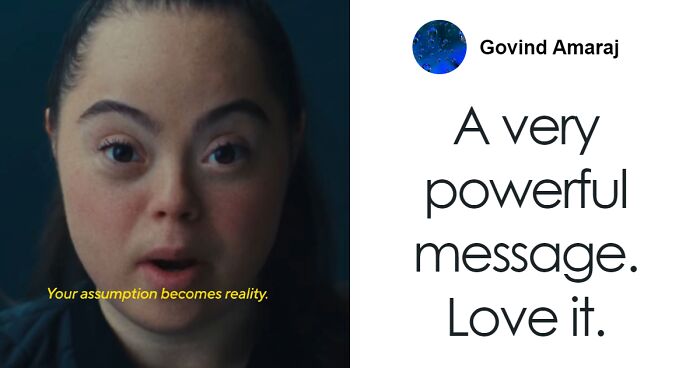
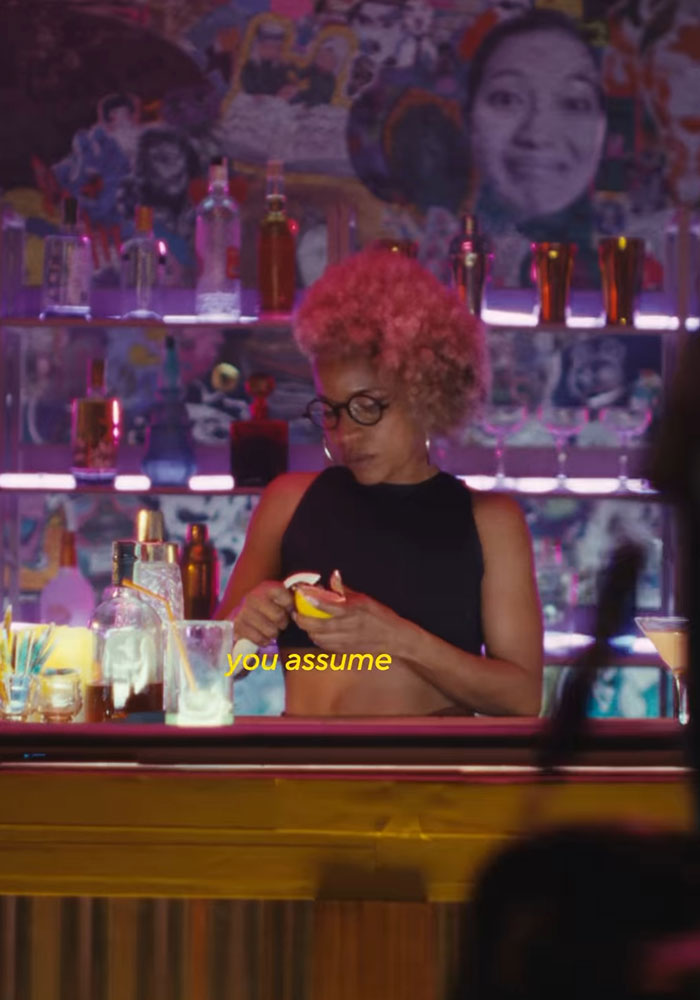
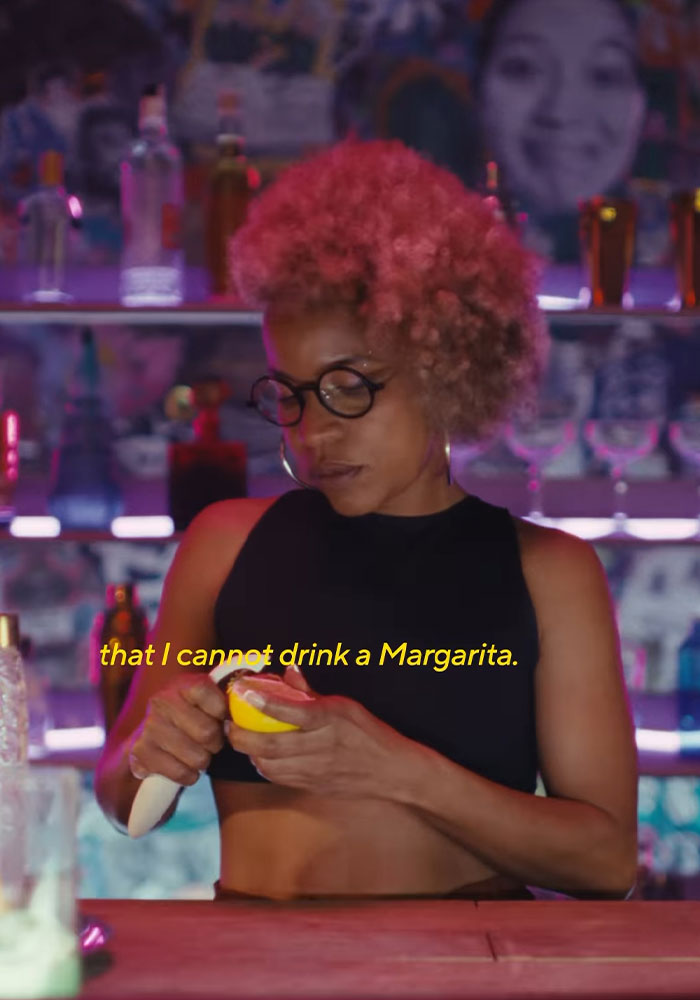
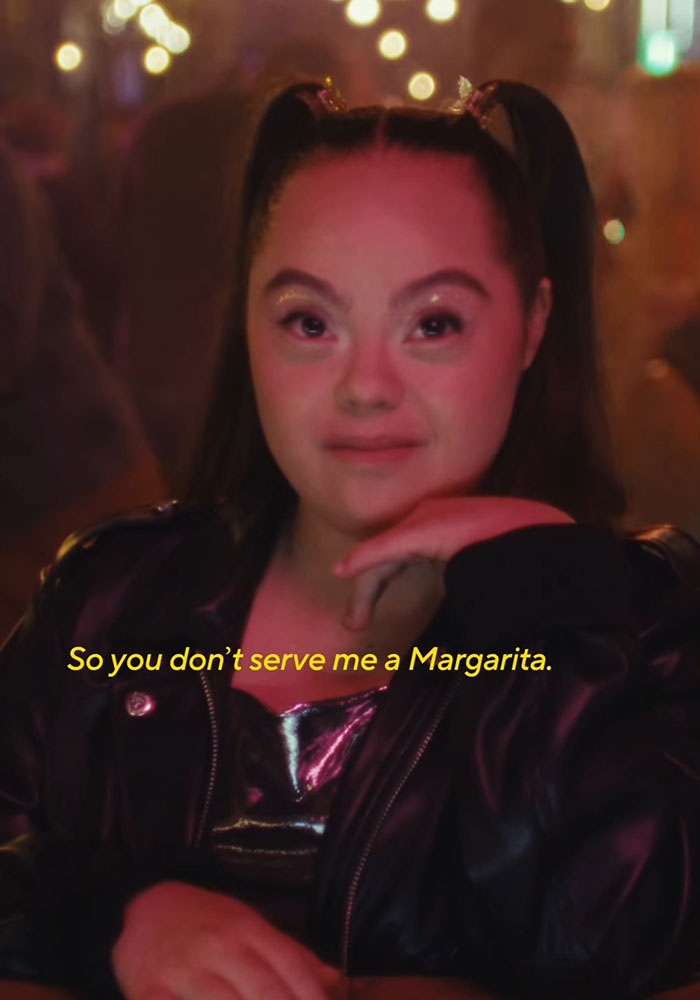
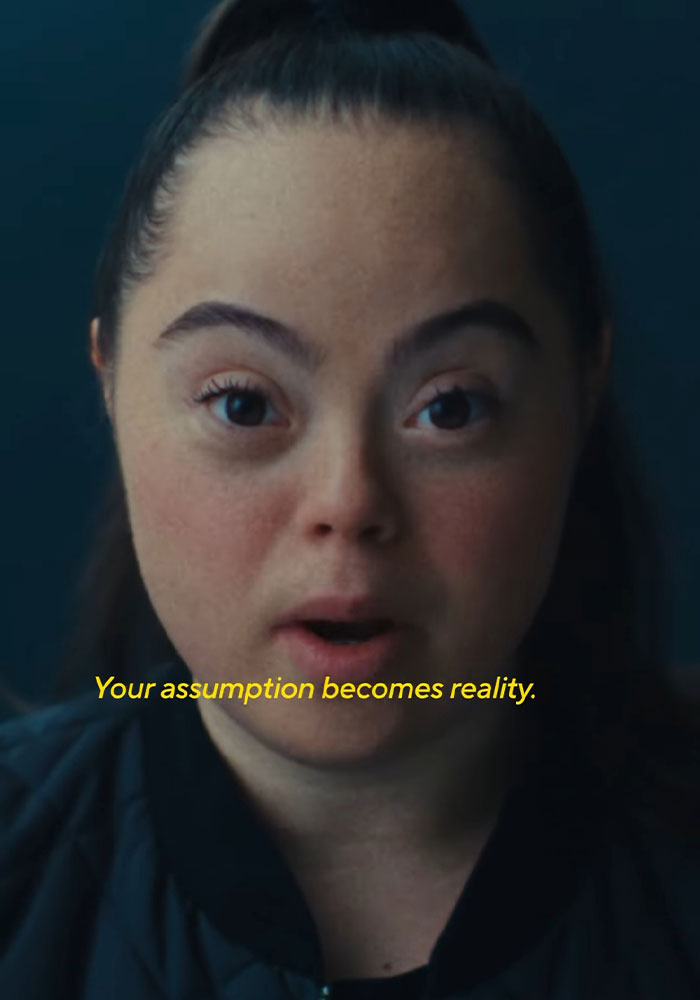



















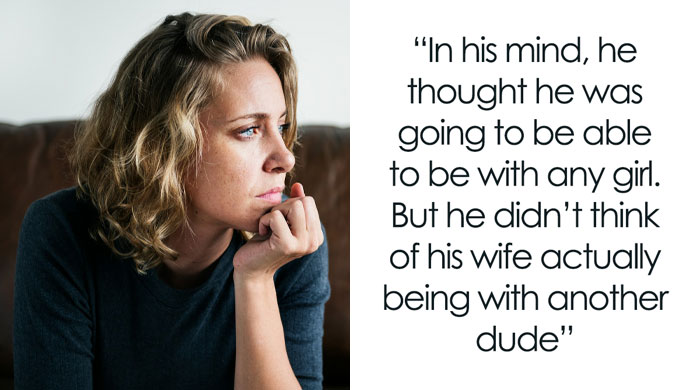


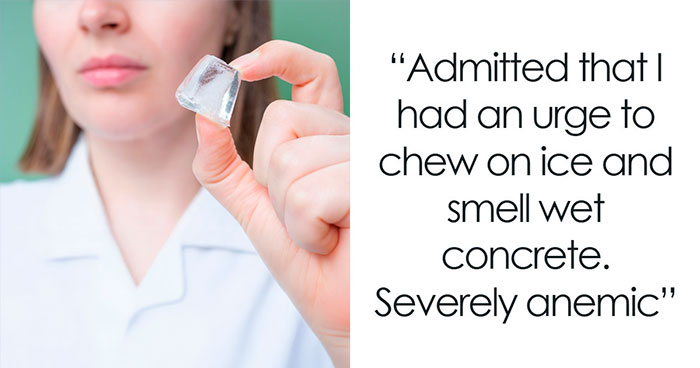
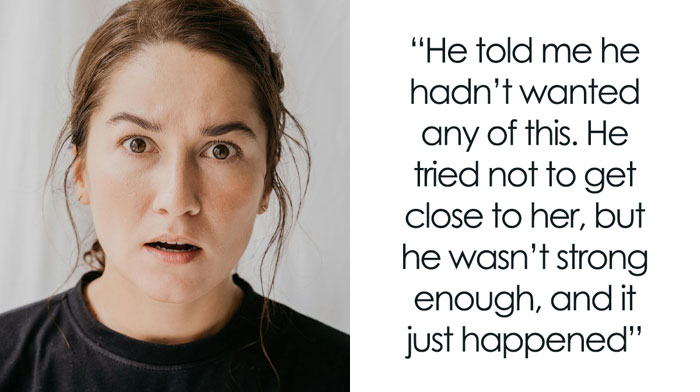






























51
47